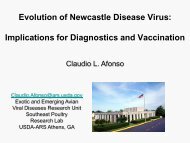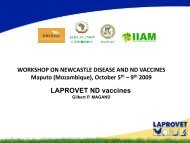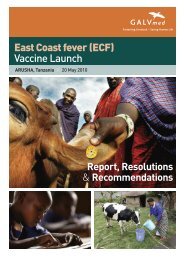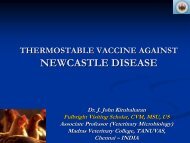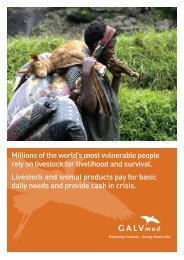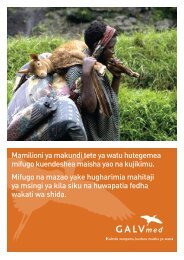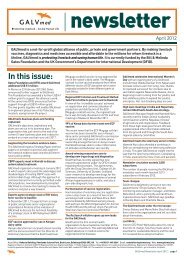A Path to Prosperity New Directions for African Livestock
GALVmed Impetus Strategy Paper
GALVmed Impetus Strategy Paper
- No tags were found...
You also want an ePaper? Increase the reach of your titles
YUMPU automatically turns print PDFs into web optimized ePapers that Google loves.
2.2.1 Lives<strong>to</strong>ck Sec<strong>to</strong>r Policy<br />
Lives<strong>to</strong>ck sec<strong>to</strong>r policy covers a multitude of issues<br />
and there are no studies that compare how effective<br />
lives<strong>to</strong>ck policy is, relative <strong>to</strong> other agricultural<br />
sub-sec<strong>to</strong>rs, in supporting poor and small farmers.<br />
A key finding of a 1998 review of best practice in the<br />
lives<strong>to</strong>ck sec<strong>to</strong>r 13 was that there was little evidence<br />
<strong>to</strong> show that lives<strong>to</strong>ck projects had achieved<br />
sustained benefits <strong>for</strong> poor lives<strong>to</strong>ck keepers.<br />
A few relatively successful projects s<strong>to</strong>od out as<br />
achieving sustainable change. Common features<br />
of these “institutional,” projects were a combination<br />
of community-based approaches, private sec<strong>to</strong>r<br />
involvement and the creation of enabling policy<br />
and legislative environments. One response <strong>to</strong><br />
studies such as these has been <strong>to</strong> initiate more<br />
policy focused initiatives, such as FAO’s Pro Poor<br />
Lives<strong>to</strong>ck Policy Initiative 14 and AU/IBAR’s Alive<br />
partnership 15 .<br />
In 2004, AU/IBAR reported on a lives<strong>to</strong>ck policy<br />
landscape study 16 . Senior policy makers from<br />
eastern Africa were asked <strong>to</strong> assess policy and<br />
institutional constraints in the lives<strong>to</strong>ck sub-sec<strong>to</strong>r<br />
as part of an initiative <strong>to</strong> develop a regional<br />
programme focusing on policy re<strong>for</strong>m and targeted<br />
at poor producers. The IBAR team spoke <strong>to</strong><br />
Ministers, Permanent Secretaries, Heads of<br />
Lives<strong>to</strong>ck Departments and a range of other<br />
stakeholders in five countries. The key findings<br />
from the consultation were as follows:<br />
> The policy-<strong>for</strong>mulation process in all the countries<br />
studied had the following characteristics:<br />
• A strong <strong>to</strong>p-down orientation, with heavy<br />
government influence.<br />
• Inadequate participation of the poor in the<br />
policy-making process.<br />
• Many government functionaries admitted that<br />
they needed knowledge on policy-making<br />
processes.<br />
• Policy makers were not always able <strong>to</strong> respond<br />
<strong>to</strong> frequent changes requiring updating or<br />
making of new policies.<br />
> The biggest group of lives<strong>to</strong>ck policies were<br />
actually missing or outdated policies.<br />
> Policy moni<strong>to</strong>ring and evaluation mechanisms<br />
were grossly inadequate.<br />
> The study also indicated weak and poorlycoordinated<br />
institutional arrangements <strong>for</strong><br />
pro-poor policy <strong>for</strong>mulation and implementation.<br />
> Un<strong>for</strong>tunately, the lives<strong>to</strong>ck policy and institutional<br />
support programme IBAR planned in 2004 was<br />
never funded and many of the problems identified<br />
in 2004 remain key <strong>to</strong> lives<strong>to</strong>ck development<br />
in 2011.<br />
> There was a general lack of proper recognition<br />
of the contribution of the lives<strong>to</strong>ck sub-sec<strong>to</strong>r <strong>to</strong><br />
the sec<strong>to</strong>r, national economies and in securing<br />
livelihoods <strong>for</strong> the poor. The latter is an issue that<br />
continues <strong>to</strong> cause concern 17 . Causes <strong>for</strong> this<br />
lack of recognition included past emphasis on<br />
crops and poor in<strong>for</strong>mation on the role that<br />
lives<strong>to</strong>ck play. Lack of useful data is a perennial<br />
problem that has recently been recognised by the<br />
BMGF, who are supporting the World Bank,<br />
working in collaboration with AU/IBAR, ILRI and<br />
FAO, <strong>to</strong> improve the quality of data on lives<strong>to</strong>ck in<br />
Africa <strong>to</strong> enhance the understanding of the roles<br />
of lives<strong>to</strong>ck in poverty reduction 18 .<br />
The Impetus Strategy Paper I Page 13



